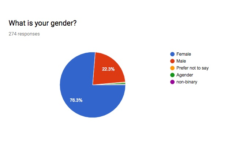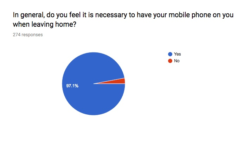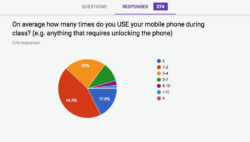Survey Results on Cultures of Mobile Phone Use
Throughout the 2017-18 academic year we have been working with a small group of Liberal Arts BA students on the Philosophy pathway of this degree, to examine research methods, notions of creativity and to investigate the existing cultures of mobile phone use amongst University of Leeds students.
Part of this work resulted in a student-centred investigation, with full University of Leeds ethical approval and this was planned and delivered as part of the Level 2 FOAR2000 Research module that the students were undertaking. They developed a survey which was refined through testing and then launched as an on-line questionnaire with an aim to elicit responses from a cross-section of students across all of the Faculties of the University. The survey was undertaken in March and April 2018 at the end of the spring term and remained open throughout the Easter vacation.
Here is a summary of the Initial Findings
There were a total of 274 Respondents - 82 % aged between 18 and 22 
Over 3/4 of respondents identified as female

Only 8 respondents felt comfortable leaving their mobile phone at home
There was evidence of a significant amount of awareness of checking the mobile phone during class time

The overwhelming reasons were checking for messages, notifications and social media. A significant number reported checking the time, accessing the lecture slides or the virtual learning environment and as a distraction - out of boredom.
82.5% of respondents actively used their mobile phone during a taught session

Around 15% of these responses appear to be related directly to learning associated with the class e.g. 'googling', 'checking words', 'researching something I'm unclear on'.
30% admit to using their phones for activities not related directly to the learning

42% of respondents consider that their use of their mobile phone is a creative activity

The overwhelming responses in this category were related to taking and editing photos and posting (e.g. on Instagram) Some respondents also noted music recording and listening as a creative act.
Perhaps surprisingly, there was conflicting evidence as to whether the mobile phone was considered an enabler of creativity.

Further responses and analysis of the survey results will be published here soon.
